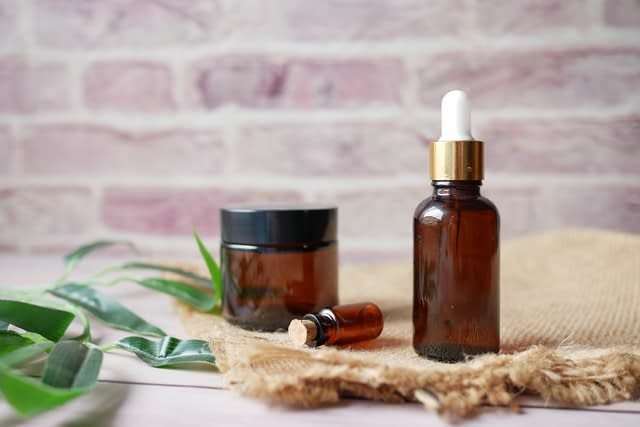Although there isn’t much scientific proof to back up the efficacy of natural beard growth remedies, some people think some techniques could encourage hair growth.
Remember that every person will experience different outcomes, and it is better to speak with a healthcare provider before attempting a new treatment.

Here are a few natural remedies for beard growth that people often think about:
Jojoba Oil:
Jojoba oil is one of the best natural oils for beards and has a similar texture to our skin oil.
The similar consistency lets the oil absorb better, moisturize, and prevent beard dryness. It promotes a healthy, soft beard, making it a popular choice for beard care routines.
Although it doesn’t immediately encourage hair follicles to grow, its nourishing properties on the skin beneath the facial hair produce the ideal conditions for beard health.
Jojoba oil is lightweight and readily absorbed. Frequent use can help maintain a manageable, well-conditioned beard, and its natural properties make it safe for people with sensitive skin.
Argan Oil:
Argan oil is a popular option for promoting beard growth and overall beard.
Argan oil is rich in fatty acids, antioxidants, and vitamin E, crucial components that nourish the skin beneath the beard and hair.
Its moisturizing qualities aid in preventing dryness, minimizing frizz, and giving the beard a healthy sheen.
The elements in argan oil help make beards healthier and create an environment more favorable for development, even if there isn’t much scientific data on how they directly affect beard growth.
Regularly incorporating argan oil into beard care practices can result in a smoother, easier-to-manage, and better-conditioned beard.
Rice Water:
Rice water is a traditional remedy believed to benefit beard growth.
It contains vitamins, minerals, and amino acids, which may strengthen and improve the hair texture.
The nutrients in rice water may feed the hair follicles, fostering an environment that’s ideal for beard growth.
Although a few scientific proofs are there to support its efficacy, some people wash their beards with rice water.
Rice water is made by soaking rice in water and then using the liquid to nourish the beard. Individual outcomes may differ as with any natural remedy, and application consistency is frequently crucial.
Onion Juice:
A natural cure that is said to encourage beard development is onion juice. Because of its high sulfur content, it stimulates hair follicles, which may promote the growth of facial hair.
The synthesis of collagen, a protein vital to hair growth, requires sulfur. Although some people report success, there is little scientific proof that onion juice, in particular, promotes beard development.
People usually use it by extracting the juice from onion and applying it to the region around their beards.
Remember that onion juice has a strong smell and can irritate some people’s skin, so doing a patch test and asking your dermatologist before using it frequently is advised.
Peppermint Oil:
Peppermint oil is one of the best essential oils for beards, as it can stimulate beard growth.
It has menthol, which could increase blood flow to the hair follicles and encourage the growth of beards.
While scientific evidence on its effectiveness is limited, some people mix diluted peppermint oil with carrier oils and massage the region around their beards.
The invigorating scent of peppermint oil also provides a refreshing and pleasant experience. Also, use peppermint oil sparingly and conduct a patch test to prevent skin irritation.
Tea Tree Oil:
Tea tree oil, known for its antimicrobial properties, helps maintain a clean beard and healthy environment.
Although there isn’t much scientific data connecting tea tree oil to the development of beards, its antimicrobial and antifungal properties might improve hair health in general.
Tea tree oil helps maintain a clean face, which may inadvertently contribute to the ideal conditions for beard growth.
Applying undiluted tea tree oil to the beard might irritate the skin, so dilute it with the best carrier oil first.
Baby Oil:
Baby oil, as the name implies, is obviously for babies not for beards, but can be used in beard care for its moisturizing properties.
This lightweight mineral oil-based lotion helps to maintain the skin’s hydration and softness.
Although baby oil doesn’t contain things that can stimulate beard growth, it can help keep your beard nourished and avoid dryness.
Using baby oil regularly could make your beard smoother and easier to manage.
Vaseline:
Using Vaseline or petroleum jelly for beard growth is not a common practice. However, because of its moisturizing qualities, it may help to maintain beards.
Vaseline forms a barrier that helps to condition and maintain a soft beard by holding moisture in and preventing dryness.
Vaseline contains no chemicals known to stimulate hair growth but can improve beard health by keeping it hydrated.
It is crucial to use Vaseline sparingly because it might be thick and challenging to remove.
Rosehip Oil:
Rosehip oil is prized in beard care for its possible advantages in enhancing general hair health, although there isn’t much solid proof that it directly correlates with beard development.
Rosehip oil is high in vitamins, antioxidants, and vital fatty acids, moisturizes the beard, and may help with skin regeneration.
This nutrient may improve the appearance of your beard and possibly foster a growth-promoting atmosphere.
Regular use of rosehip oil may noticeably improve the texture and softness of their beard.
Fenugreek:
Fenugreek is a natural herb, high in proteins, nicotinic acid, and other nutrients, and is supposed to fortify hair roots and encourage hair growth.
Some people use fenugreek in their beard care routine by pinning fenugreek seeds to a paste and rubbing it into their beards.
Although there is limited scientific proof supporting its effectiveness in promoting beard growth, fenugreek has a long history in traditional hair care practices.
Olive Oil:
Olive oil is a popular natural remedy in beard care for its versatile benefits.
It is high in monounsaturated fats, vitamins, and antioxidants, profoundly hydrates and conditions the beard, minimizing frizz and enhancing its beauty.
Its nourishing qualities support the general health of the beard even though it is not directly proven to stimulate beard growth.
Olive oil is frequently used in DIY beard masks or in mixtures with other oils. Regular use can result in a softer, more manageable beard.
Sweet almond oil has a high vitamin and mineral content and is a popular choice for beard maintenance.
Sweet Almond Oil:
Sweet almond oil is rich in fatty acids, proteins, and vitamin E, which makes it a nutritious and hydrating oil for beards.
It contributes to a softer and more manageable beard by conditioning and softening facial hair.
Sweet almond oil’s nutrient-rich composition promotes general hair health even if it is not scientifically proven to stimulate beard growth to promote beard development.
In addition, its subtle, somewhat sweet scent adds a pleasant touch to beard care regimens.
Coconut Oil:
One common and effective substance for beard maintenance is coconut oil. Coconut oil, which has a reputation for hydrating, keeps the beard hydrated and encourages a soft, conditioned texture.
The lauric acid in coconut oil contains antibacterial qualities that can help maintain a healthy environment for the beard, even if it is not scientifically proven to be a reliable way to promote beard growth.
It’s a popular choice in beard care routines because of its light consistency and beautiful aroma. Regular use of coconut oil could lead to a glossy and easier-to-manage beard.
Castor Oil:
Castor oil is a popular natural beard care product that may help promote beard growth. It is high in omega-6 fatty acids and ricinoleic acid that help to stimulate hair follicles, resulting in longer and thicker beards.
Many people use castor oil in their regimen for beard care despite the limited scientific data to support its effectiveness.
Its thick viscosity makes it easier to apply when combined with carrier oils. A softer, better-groomed beard could be the outcome of consistent usage.
Since castor oil’s richness can be too heavy for some people, it’s crucial to do a patch test and use it sparingly.
Rosemary Oil:
Rosemary oil is favored in beard care for its potential benefits in promoting hair growth and overall hair health.
It has antioxidants that may enhance blood flow to the hair follicles and promote the thickness and growth of the beard.
Although there is little scientific proof that rosemary oil promotes beard growth, it is frequently included in beard oils and balms.
Its pleasing herbal aroma gives the beard care regimen a sensory component. To prevent skin sensitivity, dilute rosemary oil before applying it, just like other essential oils.
Conclusion:
In conclusion, plant-based items like jojoba oil, argan oil, essential oils, and others are well-liked options for natural beard growth remedies. Although these treatments might have advantages such as conditioning, hydrating, and possibly encouraging the best conditions for hair health, there is frequently little scientific proof of their direct effect on beard growth.
